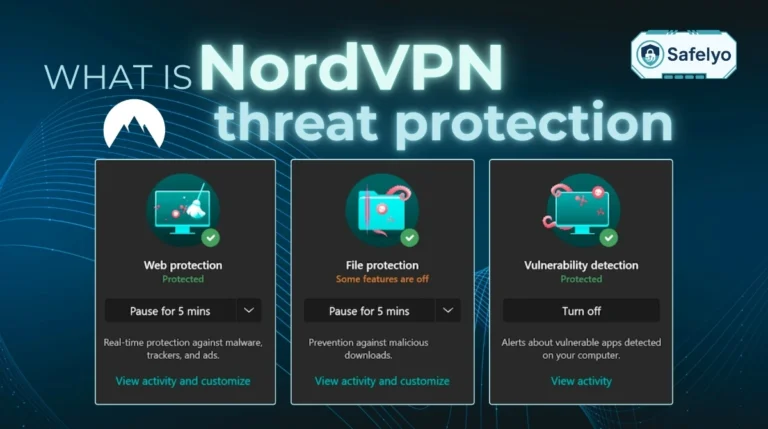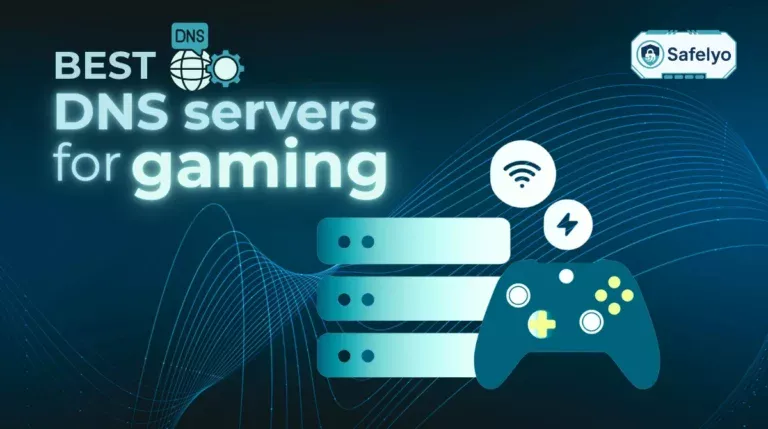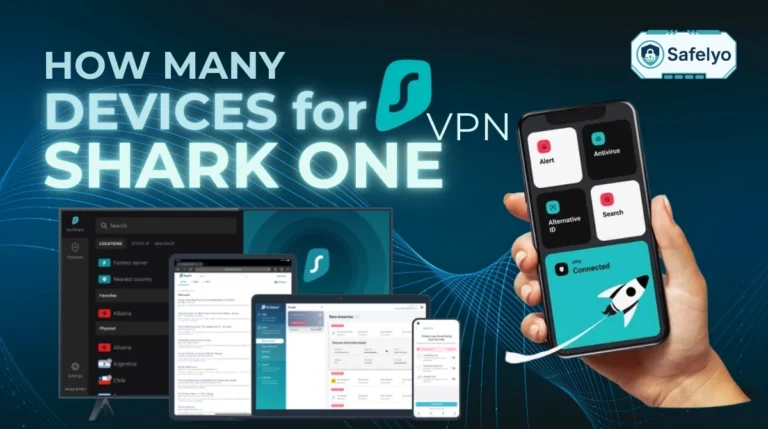Think of the best password managers not as a simple list, but as the master key to your entire digital life – one that securely locks every door behind you. It’s your personal security guard, your digital vault, and your frontline defense against the ever-present threats of the online world.
In an age where major data breaches are daily news, relying on memory or your browser’s basic autofill is like leaving your front door unlocked. From banking details to private messages, your entire identity is protected by passwords, and a single weak link is all a hacker needs.
As a cybersecurity analyst, I’ve spent years testing these tools, and I’ve seen firsthand how easily a person’s digital life can be compromised by one reused or forgotten password. A dedicated password manager isn’t just for tech experts; it’s the single most powerful step anyone can take to reclaim their online security.
In this comprehensive guide, you’ll discover:
- Our top 5 expert-vetted password managers for 2025.
- Why new tech like passkeys is the future and which tools already lead the way.
- The critical security differences between browser managers and dedicated apps.
- How to choose the perfect solution for your needs, whether for your family or just for yourself.
Don’t wait for a security alert to take your digital safety seriously. Let me guide you in building your fortress.
1. Our top 5 password managers for 2025 at a glance
After testing more than a dozen services, I’ve found that these five consistently stand out. It’s not about finding one “perfect” tool, but about finding the one that’s perfect for you. Think of this list as a starting point to identify which one best fits your digital life. Each one excels in a different area, from family password sharing to ultimate privacy control.
- 1Password – Best overall for ease of use & family features. This is the gold standard for a reason. It just works, beautifully, everywhere.
- Bitwarden – Best for privacy, open-source, & free users. If you value transparency and want the most powerful free service on the market, your search ends here.
- NordPass – Best for users seeking a simple, streamlined security suite. It cuts out the complexity to deliver a clean, fast, and reliable experience.
- Dashlane – Best for premium features like a built-in VPN. It goes beyond unique passwords to offer a broader security toolkit in one subscription.
- Keeper Security – Best for secure file storage & advanced security options. For those who need to lock down more than just strong passwords, Keeper offers a true digital vault.
BEST PASSWORD MANAGERS OF 2025: A FEATURE COMPARISON
Note: Prices are approximate starting points for individual annual plans and can vary. "Limited" free plans often restrict the number of devices or passwords, while a "Basic" plan may lack key features like cloud sync.
I get it – after a while, all the features and pricing tiers can start to blur. To make things crystal clear, I’ve laid out the most critical details for our top 5 contenders side-by-side. Use this table to quickly compare the things that matter most, from passkey support to whether you can start for free.
| Feature | 1Password | Bitwarden | NordPass | Dashlane | Keeper Security |
|---|---|---|---|---|---|
| Overall Score | 9.5/10 | 9.2/10 | 8.8/10 | 9.0/10 | 8.9/10 |
| Free Version | 14-day trial | Yes (Generous) | Yes (Limited) | Yes (Limited) | Yes (Basic) |
| Family Plan | Excellent | Excellent | Good | Good | Excellent |
| Passkey Support | Excellent | Good | Good | Excellent | Good |
| Security Audits | Yes (Regular) | Yes (Open Source) | Yes (Regular) | Yes (Regular) | Yes (Regular) |
| Starting Price | ~$2.99/mo | ~$0.83/mo | ~$1.99/mo | ~$2.75/mo | ~$2.92/mo |
Now, let’s dive deeper into our hands-on experience to see what makes each of these password managers stand out.
2. In-depth reviews: Our hands-on testing
A list of names and prices is one thing, but how do these tools feel in day-to-day use? To find out, I installed each one on my Windows PC, MacBook, and Android phone. I imported my messy collection of browser-saved passwords, set up two-factor authentication, and used them for everything – from logging into my bank to ordering pizza on a Friday night.
Here’s the detailed breakdown of how each of our top 5 performed in the real world.
2.1. #1 – 1Password
1Password – Best choice overall
Best for: Individuals and families who want a beautifully designed, intuitive password manager that’s packed with powerful features that are genuinely easy to use.
From the moment I installed 1Password, the experience felt polished. The setup process is easily the smoothest I’ve tested. A helpful wizard walked me through creating my Master Password and, crucially, saving my Secret Key (more on that below). Importing my hundreds of passwords from Chrome was a one-click affair, and within minutes, my digital life was neatly organized inside the vault.
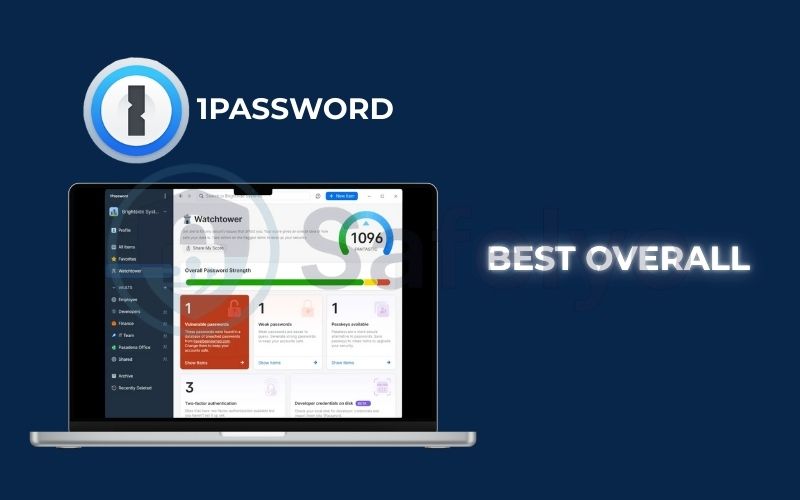
What truly sets 1Password apart is its autofill. It’s almost psychic. On complex login pages where other managers get confused, 1Password correctly identifies the username and password fields nearly every time. On my phone, it integrates seamlessly with Face ID, making app logins instantaneous.
The “Watchtower” feature is another standout – it’s not just a list of weak passwords. It gives you clear, actionable alerts, like “You’re using this password on 5 sites, and one of them was breached. Go fix these first.” It turns a scary notification into a simple to-do list.
Passkey support
This is where 1Password is living in the future. I tested it by creating a passkey for my Google account. The process was seamless. 1Password’s browser extension prompted me to save the passkey, and the next time I logged in, a simple biometric scan on my laptop was all it took. There was no password field at all. It felt like magic and is currently the best, most user-friendly implementation of passkeys on the market.
Security model
1Password uses a standard architecture named zero-knowledge, but with a unique twist: The Secret Key. This is a 34-character code stored only on your devices. It works alongside your master password, meaning even if someone stole your password, they still couldn’t access your vault without this key. It’s like having a second, secret deadbolt on your digital safe.
PROS
- Superb, intuitive user interface
- Best-in-class autofill performance
- Excellent family sharing features
- Industry-leading passkey implementation
- Unique Secret Key for added security
CONS
- No free version available (only a trial)
- Slightly more expensive than some rivals
For its unmatched combination of usability, strong security, and forward-thinking features, 1Password is our top recommendation for most users in 2025. It’s the password manager I personally use and install for my family because it removes the friction from being secure.
>> Want to see it in action? Please read our full, in-depth 1Password review for a closer look at all its features.
2.2. #2 – Bitwarden
Bitwarden – Best for privacy, open source, & free users
Best for: Privacy-conscious users, tech enthusiasts, and anyone looking for the most capable free password manager on the planet.
Bitwarden is the darling of the privacy community for a good reason: It’s one of the open-source password managers. For me, this transparency creates a foundation of trust that’s hard to beat. The setup is straightforward, and while the user interface isn’t as flashy as 1Password’s, it’s clean, functional, and incredibly fast.
I was immediately impressed by its free plan. It offers unlimited passwords across unlimited devices, a feature for which nearly every competitor charges a premium. This isn’t a stripped-down trial – it’s a full-featured password manager that will be more than enough for many individual users.
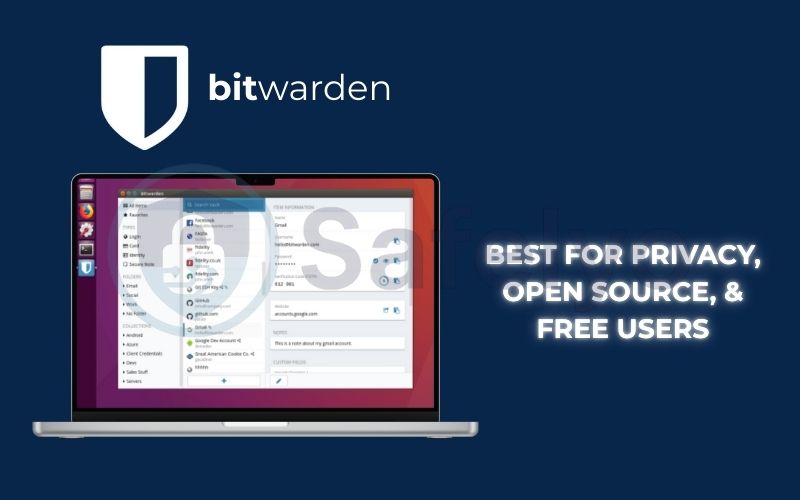
The autofill is reliable on both desktop and mobile, handling most sites without a hitch. Where Bitwarden truly shines for advanced users is its flexibility. You can even choose to self-host your own vault on a personal server, giving you absolute control over your data. For most people, that’s overkill, but knowing that level of control is possible speaks volumes about the company’s philosophy.
Passkey support
Bitwarden has integrated passkey support, and it works well. Saving and using passkeys is managed directly from the browser extension and mobile apps. While the user experience is slightly less polished than 1Password’s, it’s fully functional and shows a strong commitment to supporting this next-generation technology.
Security model
Bitwarden’s security is built on a fully open-source codebase. This means that its code is publicly available for security researchers around the world to scrutinize, test, and audit for vulnerabilities. It also uses a standard end-to-end, zero-knowledge encryption model, so only you can ever access your data.
PROS
- Superb, intuitive user interface
- Best-in-class autofill performance
- Excellent family sharing features
- Industry-leading passkey implementation
- Unique Secret Key for added security
CONS
- No free version available (only a trial)
- Slightly more expensive than some rivals
If you prioritize transparency, want maximum control over your data, or simply want the best free password manager available, Bitwarden is the undisputed winner. Its premium plan is also one of the most affordable, making it an incredible value proposition.
>> To see how its features stack up against the premium competition, check out our comprehensive Bitwarden review.
2.3. #3 – NordPass
NordPass – Best for users seeking a simple, streamlined security suite
Best for: Users who value simplicity and speed, and especially those already invested in the Nord Security ecosystem (like NordVPN).
In a field crowded with features, NordPass stands out for its elegant simplicity. From the moment I installed it, the experience felt light and uncluttered. There are no complex settings to navigate or a dozen sub-menus to learn. It focuses on doing the core job of a password manager – saving and filling passwords – and it does it exceptionally well. The autofill was snappy and accurate during my tests.
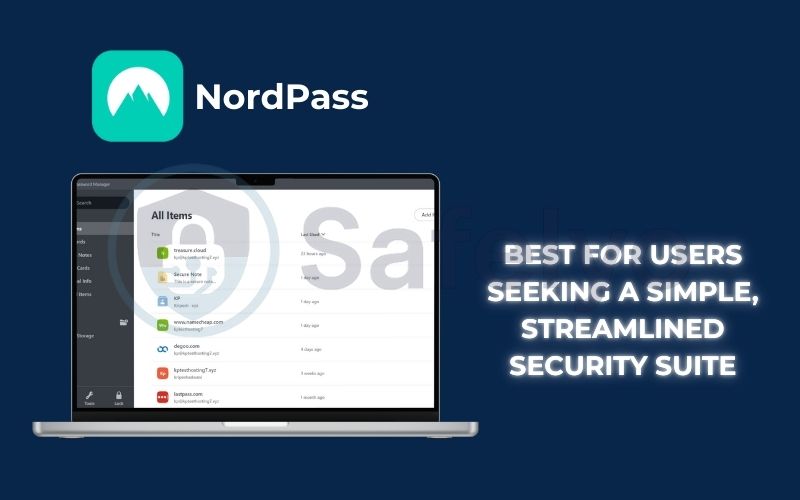
In a landscape full of complex features, NordPass shines with its refined simplicity. They share a similar design philosophy and management dashboard, which creates a cohesive security experience. If you’re someone who gets overwhelmed by too many options, NordPass’s streamlined approach is a breath of fresh air. It proves that powerful security doesn’t need to be complicated.
Passkey support
NordPass has rolled out full passkey support, allowing you to save and use passkeys for passwordless logins. The feature is integrated directly into the browser extension and works smoothly, ensuring that even this minimalist password manager is ready for the future.
Security model
NordPass is built by the trusted team behind NordVPN. It uses a standard zero-knowledge architecture and a modern encryption algorithm called XChaCha20, which is known for being both incredibly secure and efficient. This focus on next-generation cryptography ensures your data is protected by the latest standards.
PROS
- Extremely simple and easy-to-use interface
- Fast and reliable autofill performance
- Part of the trusted Nord Security ecosystem
- Uses modern XChaCha20 encryption
CONS
- The free version is quite limited
- Fewer advanced features than competitors
NordPass is the ideal choice for the user who wants their password manager to be powerful yet invisible. It’s perfect for those who don’t want to tinker with settings and just need a reliable tool that works seamlessly in the background.
>> Curious about its performance and how it integrates with NordVPN? Dive into our detailed NordPass review.
2.4. #4 – Dashlane
Dashlane – Best for premium features like a built-in VPN
Best for: Users who want more than just a password manager and are looking for an all-in-one security suite with premium extras.
Dashlane presents itself not just as a vault, but as a comprehensive security dashboard. Its interface is slick and modern, and it excels at making security easy to understand. The Password Health score is a great example – it gamifies the process of improving your security by giving you a single, clear metric to improve. During my testing, it also offered one of the most reliable autofill experiences, on par with 1Password.
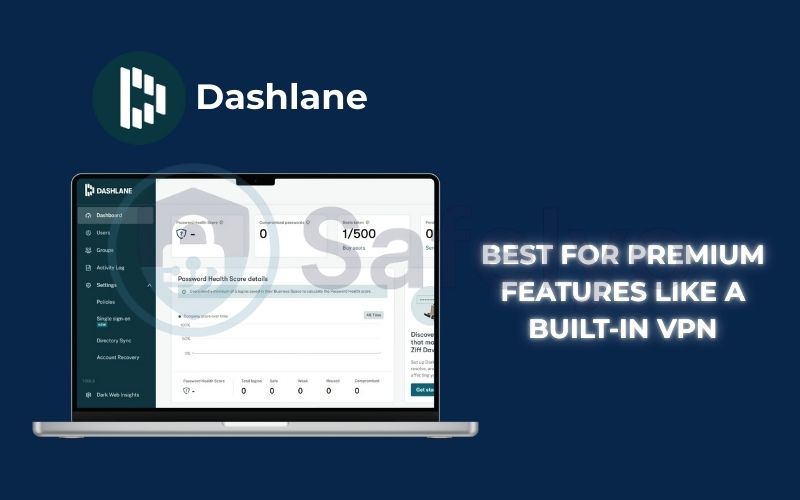
The real differentiator, however, is the suite of bundled tools. Dashlane plans come with Dark web monitoring and a Built-in VPN. I tested the VPN, and while it won’t replace a full-featured standalone service, it’s perfect for securing your connection on public Wi-Fi at a coffee shop or airport. Having these tools integrated means you have fewer apps and subscriptions to manage.
Passkey support
Dashlane has been a leader in adopting passkeys, and its implementation is excellent. The in-app experience for managing passkeys is intuitive, and using them for logins is fast and reliable. Passkeys are a core part of Dashlane’s strategy for the future.
Security model
Dashlane uses a trusted zero-knowledge architecture and has a strong track record of regular third-party security audits. Their commitment to security is evident across their platform, from their core encryption to the additional privacy features they provide.
PROS
- Excellent user interface and autofill
- Bundled extras like a VPN and dark web monitoring
- Strong passkey implementation
- Great password health and analysis tools
CONS
- More expensive than most competitors
- The VPN is basic compared to standalone services
If you’re looking for a single subscription to handle multiple aspects of your online security, Dashlane makes a compelling case. It’s a premium product with a premium price tag, but for users who will take advantage of the VPN and other extras, it offers excellent value.
>> For a complete breakdown of its premium features, explore our full Dashlane review.
2.5. #5 – Keeper Security
Keeper Security – Best for secure file storage & advanced security options
Best for: Individuals and businesses who need to securely store and share more than just passwords, such as sensitive files, photos, and documents.
While many competitors started with a consumer focus, Keeper has a long-standing reputation in the enterprise security world, and that robustness is evident in its consumer product. The interface is clean and professional, prioritizing security and functionality.
The standout feature for me is its secure file storage. I uploaded scans of my passport and some confidential contracts, and the process was as simple as dragging them into a secure, encrypted folder within my vault. This is a huge benefit for anyone wanting to consolidate all their sensitive digital information in one place.
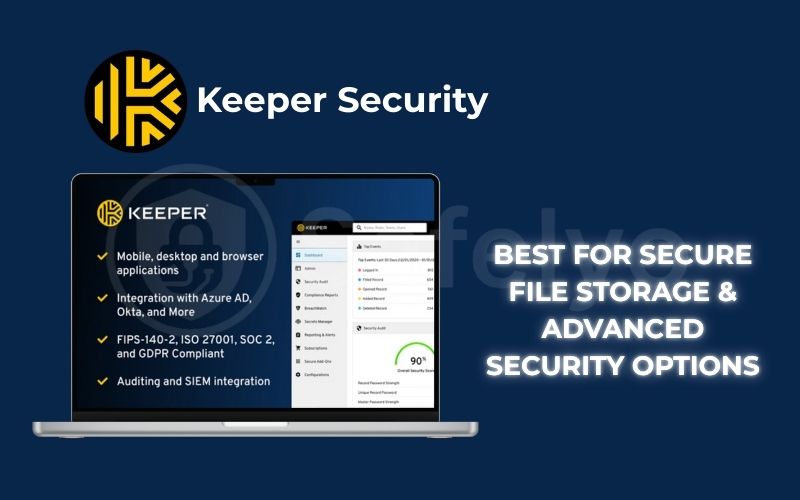
Keeper also offers some of the most granular sharing controls. You can set expiration dates for shared items, grant one-time access, and easily revoke permissions, making it ideal for securely sharing information with family members or colleagues. Its BreachWatch feature for dark web monitoring is also highly effective.
Passkey support
Keeper provides full support for creating and using passkeys on both desktop and mobile devices. The integration is solid, ensuring users can take advantage of passwordless technology for their most important accounts.
Security model
Keeper has a zero-knowledge security model and a long history of maintaining top-tier security certifications. This includes SOC 2 compliance, which is a rigorous auditing procedure that demonstrates their commitment to data security and privacy. This enterprise-grade security provides significant peace of mind.
PROS
- Excellent secure file and photo storage
- Granular and secure sharing options
- Strong security record and compliance (SOC 2)
- BreachWatch offers trustworthy monitoring services for the dark web.
CONS
- Interface can feel a bit corporate or dated
- Some features are paid add-ons
Keeper is the digital equivalent of a high-security bank vault. If your primary need extends beyond passwords to protecting sensitive documents, financial records, or personal photos, it is one of the most trusted options available.
>> Learn more about its secure file storage and advanced sharing options in our in-depth Keeper Security review.
4. How we test: The Safelyo password manager review methodology
You deserve to know that our recommendations aren’t based on a quick glance at a feature list. At Safelyo, we believe in a rigorous, hands-on approach that simulates real-world usage. My goal isn’t just to tell you what a product does, but how well it does it when it matters most.
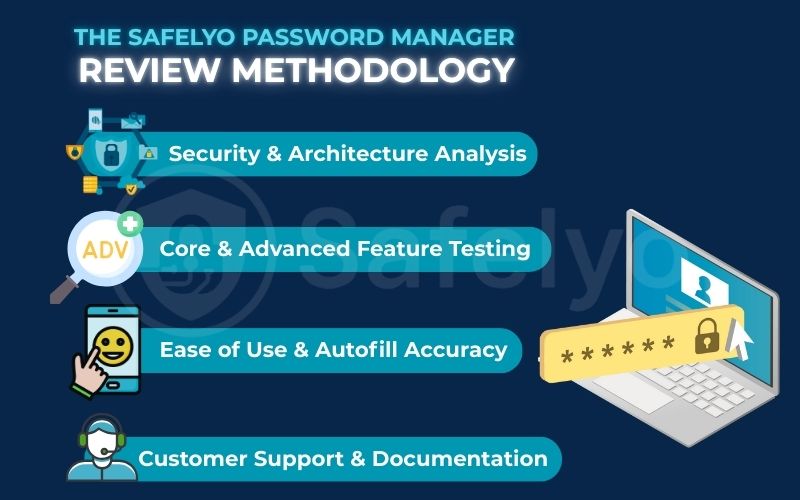
Here’s a look inside our comprehensive testing process:
1. Security & Architecture Analysis
Before I even install an app, I start with its foundation. We analyze each provider’s security model, prioritizing those with a proven zero-knowledge. This is non-negotiable. I also verify their history of independent, third-party security audits. A company that willingly opens its code to scrutiny, like Bitwarden, or publishes regular password audit results, like 1Password, earns a massive amount of trust.
2. Easy rrto use & Autofill Accuracy (The Real-World Test)
This is where I spend most of my time. I perform hands-on testing of the entire user journey:
- Onboarding: How easy is it to create an account and import passwords from a browser like Chrome? Is the process intuitive or a frustrating chore?
- Autofill Reliability: I test the autofill feature across 50+ popular websites and apps on Windows, macOS, Android, and iOS. This includes simple login pages, complex multi-step forms, and credit card checkouts to see where the software shines and where it stumbles.
- Daily Feel: How does the app feel day-to-day? Is it fast and seamless, or does it get in the way?
3. Core & Advanced Feature Testing
I go beyond basic password saving to evaluate the features that set these services apart:
- Secure Sharing: I test how easy it is to share a Wi-Fi password with a family member or a project credential with a colleague. Can I set permissions or expiration dates?
- Password Health Reports: I purposely import a list of weak and reused passwords to see how the “Watchtower” or “Password Health” dashboards present the information. Are the alerts clear and actionable?
- Passkey Implementation: Crucially, I test the entire passkey lifecycle – creating, saving, and using passkeys on multiple devices. The experience needs to be as smooth as, or smoother than, using a password.
4. Customer Support & Documentation
Finally, I assess the safety nets. I explore the provider’s help documentation for clarity. I might even pose as a new user with a common problem to gauge the responsiveness and quality of their customer support channels. My feedback can get through its email, live chat, or a community forum
Only the password managers that excel across all these categories make it onto our “best of” list.
5. The big questions: Key topics in password management today
If you’re considering a dedicated password manager in 2025, you’re likely aware that the security landscape is shifting rapidly. It’s no longer just about using a password generator to create a long string of characters. It’s about choosing a secure vendor, embracing new technologies, and understanding why a browser manager isn’t enough. Here, we address the critical topics modern users need to know.
5.1. The LastPass situation: why choosing a secure alternative matters
The name LastPass used to be synonymous with password management. However, in late 2022, the company suffered a major security breach. Attackers managed to steal encrypted customer vaults and sensitive information, including customer names and email addresses.
While LastPass maintained that the vaults were encrypted and thus theoretically secure, the incident significantly eroded user trust. Why? Because the breach involved serious security lapses, including the theft of development environment backups containing decryption keys used for certain metadata.
As a security professional, this incident was a huge red flag. It proved that even with strong zero-knowledge encryption, a vendor’s internal security practices – or lack thereof – can still put user data at risk.
This is why, when conducting our reviews, we not only look at the encryption model but also the vendor’s history of transparency and commitment to independent security audits. All the password managers on our list employ a robust zero-knowledge model and have maintained a significantly cleaner security record than LastPass.
The key takeaway:
If you are still using LastPass or were planning to, now is the time to migrate. Providers like 1Password and Bitwarden offer smooth, automated import tools to make the switch painless. Don’t risk your peace of mind on a company with a shaky security history.
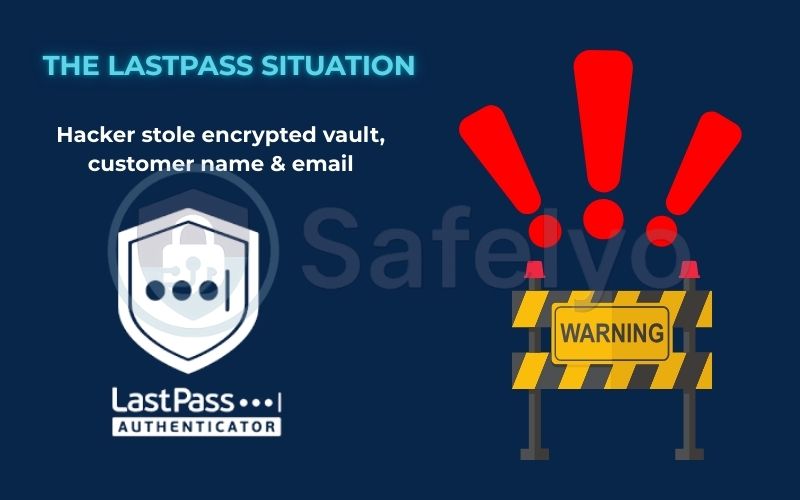
5.2. The rise of passkeys: Is this the end of passwords?
The biggest shift in online security today isn’t stronger passwords – it’s getting rid of them altogether. This is where passkeys come in.
What is a passkey?
Simply put, a passkey is a new way to log in that replaces your password with a unique cryptographic key. This key is stored securely on your device (like your phone or computer). When you log in, you approve the access using a familiar biometric scan (face or fingerprint) or a local device pin.
- It’s easier: No more typing or memorizing complex strings.
- It’s more secure: Passkeys are resistant to phishing (since they work only on the correct website) and are tied to your device, making remote theft nearly impossible.
When I first used a passkey to log into a major platform, the lack of a password field felt surreal. It was so fast and secure that I knew instantly this was the future.
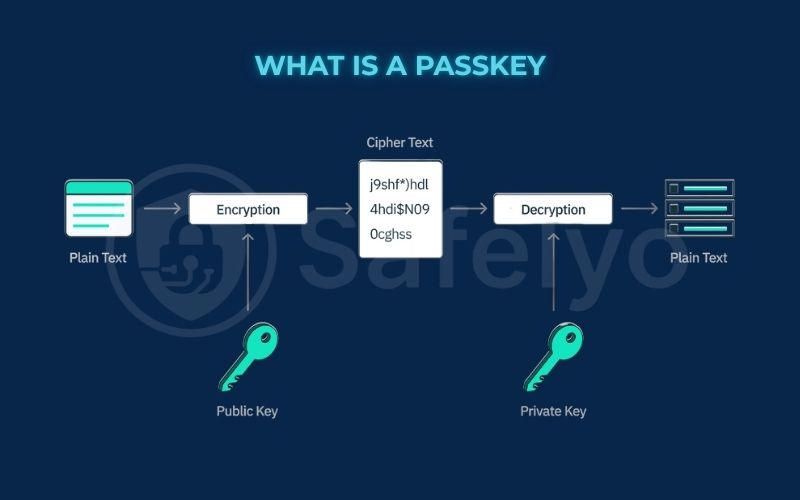
The Password Manager's role in the passkey future
For passkeys to truly work, they need to be portable. If a passkey is only tied to your iPhone or Google account, what happens when you switch ecosystems or lose your device?
This is why choosing a password manager with strong passkey support is essential:
- Cross-Platform Portability: A password manager like 1Password or Dashlane allows you to store your passkeys in their encrypted vault. This means I can create a passkey on my Windows laptop and use it seamlessly on my Android phone, independent of Apple or Google’s walled gardens.
- Central Management: Just as you manage passwords in one place, you can now manage your passkeys in your vault, making recovery and organization straightforward.
Passwords aren’t gone yet, but passkeys are rapidly becoming the preferred method for major services. Choosing the best password managers with strong passkey support toda is a smart, future-proof decision that will keep you secure and simplify your logins for years to come.
5.3. Browser password managers (Chrome/Safari) vs. dedicated apps
One of the most common questions I get is: “Why should I pay for a dedicated app when Chrome or Safari already saves my passwords for free?”
The truth is, browser managers (like Google Password Manager or Apple Keychain) are better than nothing. But they are severely limited compared to a dedicated tool built by a security company. Here’s a side-by-side comparison based on my professional experience:
| Feature | Browser PM (e.g., Google) | Dedicated PM (e.g., 1Password) |
| Security Architecture | Good (Encrypted) | Excellent (Zero-Knowledge) |
| Cross-Platform Sync | Limited (Mostly within one ecosystem) | Excellent (Works Everywhere) |
| Secure Sharing | No (Requires risky workarounds) | Yes (Built-in, Encrypted) |
| Stores More Than Passwords | No (Limited to basic credentials) | Yes (Secure Notes, Credit Cards, Documents) |
| Passkey Support | Yes (But tied to one ecosystem) | Yes (Portable across platforms) |
| Password Health Score | Basic (Simple alerts) | Detailed (Actionable risk reports) |
A browser password manager offers convenience for basic use, but it fails the modern security test in three critical areas:
- Security Depth: Browser managers are often protected by the same encryption that secures the rest of the browser. A dedicated app uses an architecture called zero-knowledge, which means even the company providing the service cannot see or decrypt your data.
- Cross-Platform Limitation: If, like me, you use a Mac at work, a Windows PC at home, and an Android phone, you’ll constantly fight with the system trying to sync your passwords across the different browser ecosystems. A dedicated app (like Bitwarden or NordPass) works seamlessly across all devices and operating systems.
- Feature Deficiency: They lack crucial advanced features like secure sharing (essential for families or teams), comprehensive dark web monitoring, and secure document storage.
For true peace of mind and full control over your digital life, a dedicated manager is the only way to go.
6. How to choose the best password manager for you
You’ve seen our top picks, but the “best” password manager is ultimately a personal choice. Your perfect match depends on your unique needs, the devices you use, and who you’ll be sharing with.
To find your ideal fit, ask yourself these four simple questions:
1. What devices are in your "ecosystem?"
Do you live entirely within Apple’s world (iPhone, Mac, iPad)? Or are you like me, with a mix of a Windows gaming PC, a MacBook for work, and an Android phone? If you use multiple operating systems, strong cross-platform synchronization is essential. Look for a service like 1Password or Bitwarden that has excellent, native apps for every device you own.
2. Who are you sharing with?
If you’re just securing your own accounts, any individual plan will do. But if you need to share passwords with a partner or your whole family, a dedicated Family Plan is a game-changer. I use 1Password’s family plan to share streaming service logins, the Wi-Fi password, and even emergency contact information in a shared vault. It’s infinitely more secure than texting sensitive information back and forth.
3. What's your budget? (And can you try before you buy?)
Your budget is a key factor. If you want the most powerful features for free, Bitwarden is the clear winner. For most other services, a premium subscription is necessary to unlock their full potential.
My advice is to always start with a free trial or a free plan first. Use it for a week. See how the autofill feels in your daily workflow. Can you live with the limitations of the free version, or do the premium features feel worth the small monthly investment?
4. How important is transparency to you?
All our top picks are secure, but they achieve that trust in different ways. If you’re the kind of person who values the ability to look “under the hood,” an open-source provider like Bitwarden should be at the top of your list. If you’re more comfortable with a company that proves its security through regular, public audits from professional firms, then services like 1Password, Keeper, and NordPass will give you that peace of mind.
By answering these questions, you’ll move from wondering “Which one is best?” to knowing “Which one is best for me.”
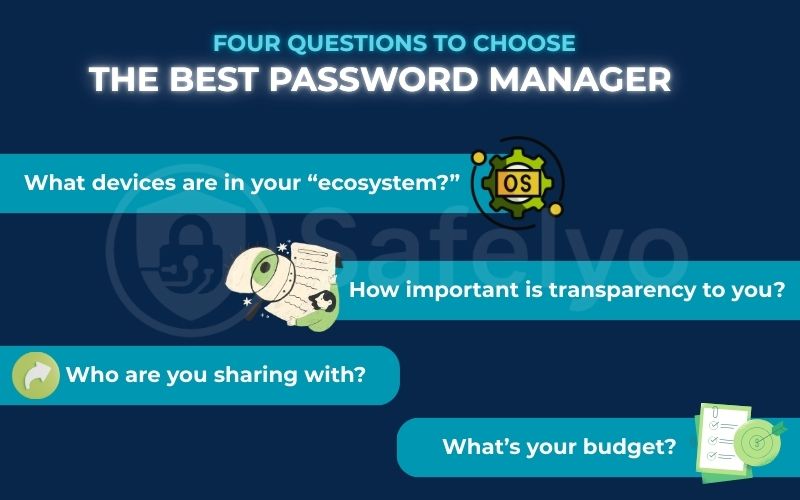
7. FAQ about the best password managers
Navigating the world of password security can bring up a lot of questions. Here are clear, direct answers to some of the most common queries I hear from users who are choosing a password manager for the first time.
Are the best password managers actually safe? Can’t they be hacked?
Yes, they are extremely safe. Reputable password managers use a zero-knowledge model, which means the company itself cannot see or access your encrypted data. Even if their servers were breached, your vault remains secure as long as your master password is strong.
Which password manager is the most secure?
All of our top-rated options (1Password, Bitwarden, Keeper) are considered exceptionally secure. The “most secure” choice depends on your preference: Bitwarden for its open-source transparency or 1Password and Keeper for their unique security features and consistent third-party audits. The critical factor is that they all use industry-leading, zero-knowledge encryption.
Which password manager has never been hacked?
While no company is immune to being targeted, none of our top recommendations have ever had their encrypted user vaults compromised. Providers like 1Password and Bitwarden have a stellar track record of protecting user data through their robust security architecture.
What happens if I forget my master password?
Due to the zero-knowledge security model, the company cannot reset your master password for you. This is a security feature, not a flaw. It is absolutely critical that you save your Emergency Kit or set up account recovery options as soon as you create your account.
Is Google’s password manager good enough?
While convenient for basic use, it is not as secure as a dedicated app. It lacks the zero-knowledge security architecture and the advanced cross-platform and secure sharing features that are standard in tools like 1Password or Bitwarden.
Should I switch from LastPass?
Yes. Given their history of security incidents and issues with transparency, we strongly recommend migrating to a more secure alternative like 1Password or Bitwarden. Their import tools make the process quick and painless.
Safelyo’s expert insight: The “zero-knowledge” double-edged sword
The term ‘zero-knowledge’ is your most important guarantee. It means the password manager company cannot see, access, or decrypt your data. This is fantastic for security. However, it also means they cannot reset your master password if you forget it. Before you do anything else, print out your new password manager’s Emergency Kit and store it in a safe, physical place – like with your passport or other important documents. Your master password is the one key to your entire digital life – protect it accordingly.
8. Conclusion
In 2025, a password manager is no longer a tool for tech enthusiasts; it’s an essential utility for everyone who uses the internet. It’s the simplest, most effective step you can take to fortify your digital defenses, eliminate password-related anxiety, and embrace future-proof technologies like passkeys.
Here are the key takeaways from our analysis:
- 1Password is our top pick for its superb balance of easy to use, powerful features, and industry-leading security.
- Bitwarden offers unbeatable value, especially for those who prioritize open-source software and want a robust free option.
- Passkey support is now a critical feature to consider for future-proofing your security and simplifying your logins.
- A dedicated password manager is significantly more secure and versatile than your browser’s built-in solution.
Stop reusing weak passwords and stressing about remembering them. Choosing any of the top password managers on this list is a massive step towards a safer, simpler digital life. A password manager is the cornerstone of your personal security, and Safelyo is here to help you build a complete fortress around your data. Explore our other Digital Tools & App Review articles to find the best software to protect what matters most.


